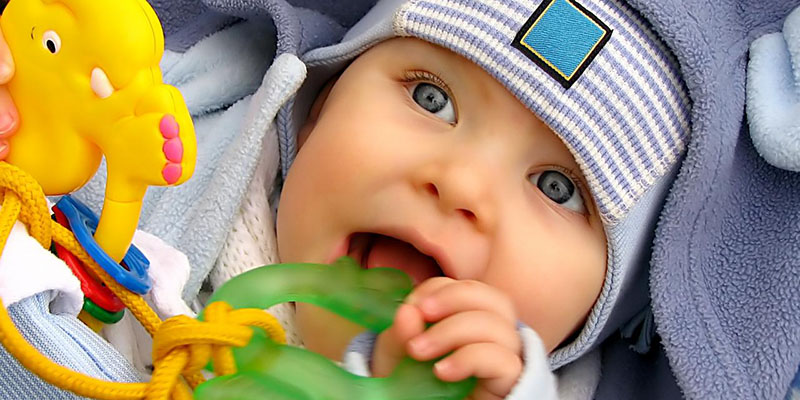
Teething Troubles: How To Soothe Your Baby’s Discomfort?
 Mother & baby
Mother & baby As a parent, it's always heartbreaking to see your baby in distress while teething. You might sometimes be helpless as the little one is in pain, irritable, and not sleeping at night. While the teething process is a normal phase in a baby's life, it isn't that easy to bear. Happily, there are ways of soothing your baby's discomfort and making this development period less overwhelming to you.
As a parent, it's always heartbreaking to see your baby in distress while teething. You might sometimes be helpless as the little one is in pain, irritable, and not sleeping at night. While teething is expected in a baby's life, it isn't easy to bear. Happily, there are ways of soothing your baby's discomfort and making this development period less overwhelming to you.

Understanding The Teething Process
Teething is among those natural periods of development in babies. It is that very period when, for the first time, an infant's first teeth-popularly known as primary teeth or simply baby teeth-start pushing through the gum. It usually starts when the infant is about six months old, although cases beginning as early as 3 months or as late as 12 months are not strange.
Symptoms And Signs
Teething makes babies uncomfortable, hence developing certain signs and symptoms. Common signs include:
• Excessive drooling
• Swollen, tender gums
• Irritable or cranky
• Sleep disorder
• Loss of appetite
• Rubbing cheeks or pulling ears
Not all babies experience the same symptoms or are equally troubled by teething.
Teething Timeline
Although every baby is different, there is a kind of order to teething:
1. Lower central incisors (bottom front teeth) usually appear first, around 6-10 months.
2. Upper central incisors follow, usually between 8-12 months.
3. After 1-2 years, the lateral incisors, canines, and molars start erupting.
Knowing this timeline will enable a parent to look forward to and prepare the baby for teething. Note, however, that slight deviations from this pattern can be considered normal and should raise no alarm.
Identify Symptoms Of Teething Problems
Physical Symptoms
Teething is considered quite an unpleasant time for the baby and the parent. The earlier the signs are recognized, the earlier the relief can be provided. Watch out for swollen, sensitive gums in places where new teeth are about to pop through. You may see your baby drooling more than usual, leading to a rash on the chin or neck. Some babies may develop a slight temperature, although fever is not considered one of the typical teething symptoms.
Behavioural Changes
Of course, your baby's behaviour will give you essential clues about the ache of teething. Irritability and restlessness easily set in, especially at meal times. You may see your baby rub his cheeks or ears or pull on his gums. Sleep is often disturbed as babies wake up more frequently or have trouble settling down for their nap at night.
Eating Habits
Teething can affect your baby's appetite. Some babies refuse food as their gums ache, while others want more because chewing comforts them. You may also notice he's far more interested in chewing on toys or his fingers than anything else. This is a natural way for him to self-soothe his discomfort.
Remember, teething is like any other part of a baby's development; babies are all very different. If you're concerned about your child's symptoms or if they seem extreme, consult your paediatrician for reassurance and advice.
Soothing Methods For Your Distressed Baby
Light Pressure And Massage
Applying gentle pressure to your baby's gums can be a great source of relief. Massage the gums in circular motions using a clean finger or soft, damp washcloth. This will soothe discomfort and stimulate blood flow, promoting healing. For added comfort, try chilling the washcloth in the refrigerator before use.
Cold Therapy
Cold objects will numb the gums and also reduce swelling. Give your baby a cold teether or cold spoon to chew on. Some parents have great luck with frozen fruit in a mesh feeder, which gives some relief and a sweet distraction. Always supervise your baby while doing this for safety.
Comfort Environment
A calm atmosphere can effectively draw their attention away from their pain. Soothing music, gently rocking, or even warm water baths may do the trick. White noise and nativities would be added to the relaxing atmosphere. Remember, extra cuddles and attention during this time can provide emotional comfort and security.
Safe Teething Toys
Give your baby something to chew on, like toys made of safe, nontoxic material and in various textures: teething rings to reach back molars, a teether with several different surfaces to massage teething areas, and so on. Rotate the toys to keep your baby stimulated and teething in various ways.

The Best Teething Toys And Remedies
Safety And Effectiveness Choices
The right toys and remedies will surely soothe your baby's teething pain. Teething rings made of safe materials or natural rubber, both BPA-free, will be good textures to chew but not harsh on fragile gums. Teething rings kept in a refrigerator can be even more soothing, considering the cooling action on the sore gums.
Variety Is Key
Try various shapes and textures; some babies love a bumpy surface, others a smooth one. Necklaces designed for parents, not babies, can be convenient for soothing on the go. However, your child must constantly be monitored when this is used due to the choking hazard.
Alternative And Natural Remedies
For many, putting a clean, wet washcloth in the refrigerator in the baby's mouth can make the texture and coolness soothing yet gentle on the gums. Some moms swear by mesh feeders filled with frozen fruit-soothers that would be comforting and healthy snacks.
Always consult a paediatrician before trying any new teething remedy that involves herbal ingredients or medicine, as these may not be appropriate for the baby's age and condition.
When To Seek Medical Advice Regarding Teething?
Teething, although within the normal development of your baby, is also among those times when you need to be able to consult a health professional. Knowing such circumstances will prepare you for when your little one needs some serious care.
Severe Symptoms
If the infant has a very high fever, over 101°F or 38.3°C, severe diarrhoea, or constant vomiting, it is necessary to seek immediate medical help. This is because all the symptoms mentioned are mainly not from teething and might result from other severe conditions.
Chronic Pain Or Ache
Call your paediatrician anytime your baby seems more miserable than usual or if the irritability persists for days. Other causes may be excluded, and appropriate therapy may be given.
Delayed Tooth Eruption
If your baby has yet to be given any indication of their first tooth by 12 months, it's worth mentioning to your paediatrician. Although the timeline for tooth eruption can be different, this could signal underlying developmental damage that should be checked.
